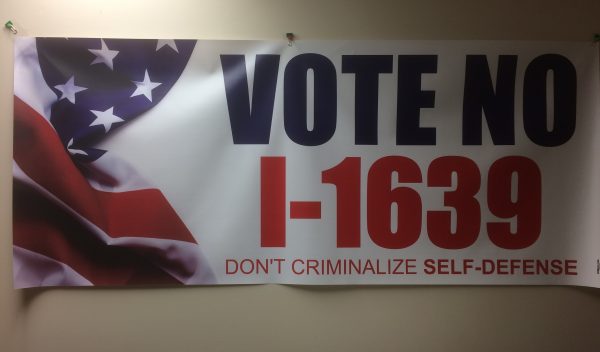
A federal lawsuit challenging I-1639 in Washington State will move forward now that a judge has ruled the plaintiffs have standing. (Dave Workman)
A federal lawsuit challenging Washington State’s gun control Initiative 1639 advanced one more step when a federal judge in Tacoma denied a motion to dismiss the action, saying that law-abiding gun owners and firearms retailers do not have to violate the law and risk punishment in order to challenge infringements of the Second Amendment.
U.S. District Court Judge Ronald B. Leighton handed down the 13-page decision.
The lawsuit was filed by the Second Amendment Foundation and National Rifle Association. Joining them are two firearms retailers at opposite ends of the state, and four young adults whose rights are directly affected by provisions of the initiative. I-1639 was passed in November 2018 by just under 60 percent of the vote, and was immediately challenged by SAF and NRA.
Earlier, a Thurston County Superior Court judge had thrown the measure off the ballot last summer because, in his opinion, the initiative petitions did not meet the requirements of state law. The full text was printed on the back of the petitions, but the typeface was so small as to be unreadable. Judge James Dixon also said language in existing law that would be repealed by the measure was not crossed out, nor was new language underlined, as required.
However, the liberal state Supreme Court reversed Judge Dixon only a week later, returning the gun control measure to the ballot. A $5 million campaign largely financed by a dozen wealthy donors including the late Paul Allen put it over the top.
In the months that passed between filing the lawsuit and the judge’s decision to deny the dismissal, legions of Evergreen State gun owners had been patiently waiting for information on how the legal action was advancing.
“The long delay (for movement) is over,” said SAF founder and Executive Vice President Alan M. Gottlieb. “The important aspects of the motion to dismiss have been denied. Just as important, the judge’s ruling treats the Second Amendment as any other fundamental individual right that is constitutionally protected.”
Judge Leighton’s ruling does a couple of things. It allows the legal action to continue, and according to Gottlieb, it puts the state and I-1639 backers on the defensive.
The initiative was the third gun control measure floated by the billionaire-backed Alliance for Gun Responsibility, the Seattle-based gun prohibition lobbying group. In 2014, the Alliance bankrolled a $10.4 million campaign to pass Initiative 594, requiring so-called “universal background checks” on all firearm transfers with very few exceptions. Two years later, they pushed an initiative allowing Extreme Risk Protection Orders (ERPO), or “red flag” gun confiscations. I-1639 bans sales of so-called “semiautomatic assault rifles” to anyone under age 21 and requires adult buyers to provide proof of taking a firearms safety course within the previous five years. It also requires an “enhanced background check,” 10-day waiting period, so-called “secure storage,” and payment of a fee to gun dealers for the additional required paperwork.
The initiative also essentially invented a definition for a “semiautomatic assault rifle,” a firearm that Spokane County Sheriff Ozzie Knezovich said does not really exist. He opposed the initiative on constitutional grounds, and he said in an interview earlier this year that among his concerns is the fact that now the state has a definition of a so-called “semiautomatic assault rifle” that might be used to ban them or otherwise heavily regulate them at some future date.




